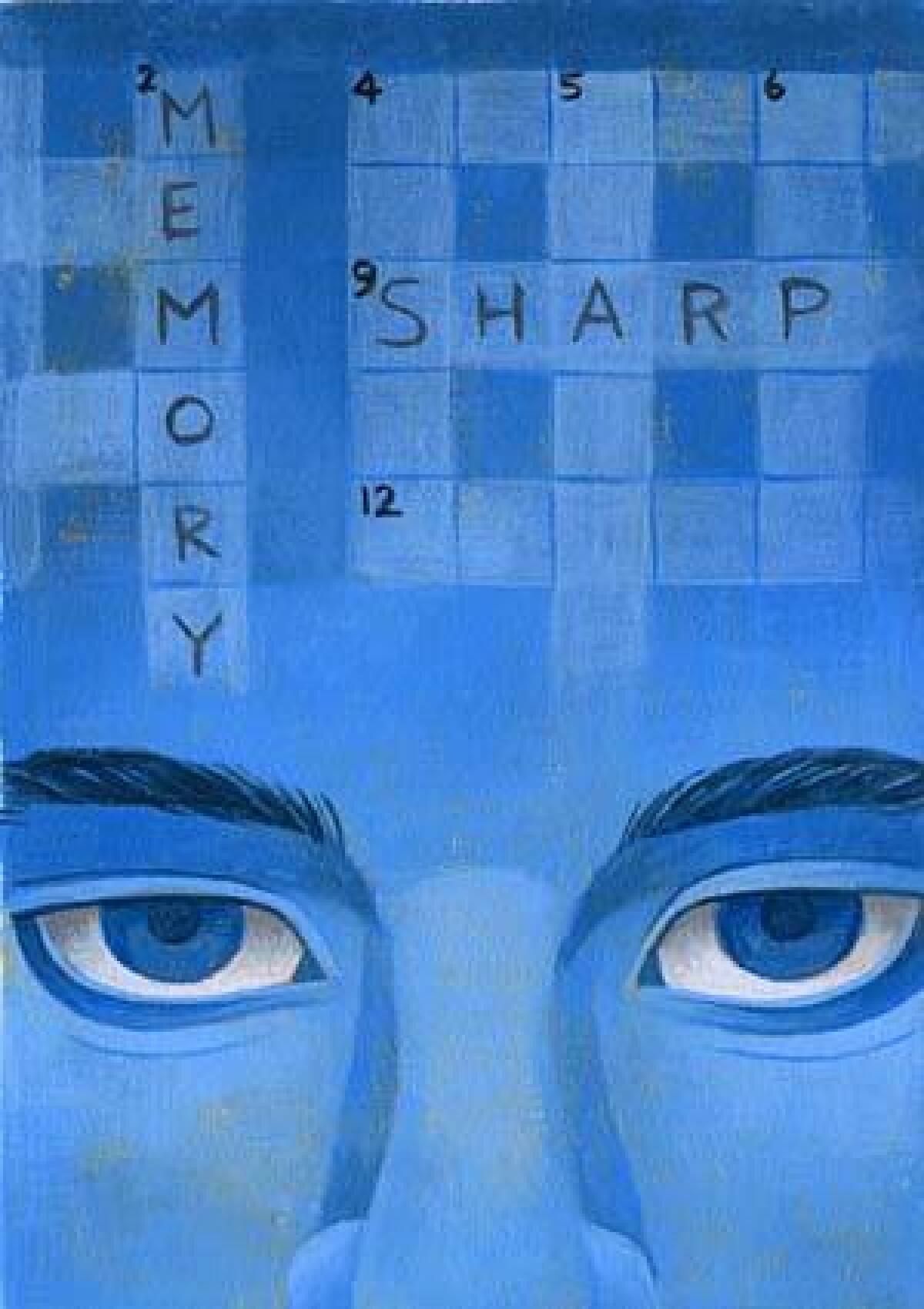Brainpower: Think upkeep

- Share via
IF you think of your brain as a car, the sleekest, fastest machine you’ll ever own is a 20-year-old brain. It accelerates effortlessly and handles sharp turns with ease. It never stalls.
Whether you use that Maserati between your ears to actually go somewhere on the road of life or spend your time doing doughnuts in the Gas-N-Go parking lot is up to you. Either way, you won’t be driving it forever.
Scientists suspect that our brainpower begins to slip as early as our 30s. As we motor through middle age, connections between brain cells falter, and levels of important brain chemicals run low. The mind gradually becomes less quick and nimble.
But all is not lost. More and more research suggests that a bit of regular maintenance work can counteract this cognitive decline and help us stay mentally sharp as we age.
“There’s growing evidence that many things that we are capable of modifying ourselves can positively impact our cognitive function as we get older,” says Molly Wagster, program director for neuropsychology of aging research at the National Institute on Aging in Bethesda, Md.
Earlier this year, a panel of experts assembled by the National Institutes of Health reviewed the scientific literature on cognitive aging. Aside from genetics, four factors stood out as good predictors of how well people keep their mental edge as they age, says Marilyn Albert, a cognitive neuroscientist at Johns Hopkins University in Baltimore, who sat on the panel.
The fab four, Albert says, are physical activity, mental activity, social engagement and cardiovascular health. (And what’s good for the gander in this case is good for the goose: Albert and other researchers say cognitive aging seems to be very similar in men and women.)
Often, the first problem people notice as they age is a drop-off in working memory, the ability to hold information in one’s mind for short periods of time. Car keys become more elusive, parking spaces harder to recall. In lab tests, aging subjects also show reductions in mental processing speed, such as the ability to make quick decisions based on new information.
For most people, these changes are so subtle that they make little difference in everyday life. And researchers say that the benefits of aging, such as accumulated knowledge and a tendency to focus on positive rather than negative emotions, probably compensates for some cognitive deficits.
An active lifestyle may provide an additional boost.
In terms of physical activity, you don’t need to be a triathlete to reap the benefits of exercise, says Arthur Kramer, a psychologist at the University of Illinois, Urbana- Champaign.
In a paper published in 1999 in Nature, Kramer and his colleagues reported that sedentary adults aged 60 to 75 years who took a brisk walk three times a week for six months improved substantially on cognitive tests that required them to juggle multiple tasks. A similar group who did non-aerobic stretching and toning exercises showed no such improvement.
More recently, Kramer’s team has found evidence that modest aerobic exercise in older adults boosts the efficiency of the frontal cortex, a brain region important for multi-tasking, planning and other high-level cognitive functions.
Very few studies have looked at the long-term cognitive effects of physical activity in young and middle-aged adults, but there are some data. In one study, for example, British researchers quizzed 1,919 men and women about their physical activity at age 36, and then caught up with them at age 43, and again at 53, to administer a set of cognitive tests. The study, published in 2003 in the journal Social Science and Medicine, found that people who reported being more physically active at 36 -- and especially those who kept it up -- experienced less memory decline in their 40s and early 50s than did their sedentary counterparts.
In general, the studies that exist suggest that starting early and staying active is a good idea, Kramer says. “Although it’s never too late, there’s no time like the present,” he says.
Exercise also helps maintain cardiovascular capacity, another factor tied to brain health. In fact, anything that helps keep the blood vessels of the heart healthy and flowing freely will do the same for the vessels that feed the brain, Albert says. “The better the brain is nourished, the better it will function,” she says. That means that controlling your blood pressure, weight and cholesterol is important for brain health. So is not smoking.
A healthy, balanced diet probably helps too. Some animal studies have found that foods high in antioxidants -- such as blueberries, strawberries and spinach -- may protect the brain from the ravages of time. There’s also some evidence that moderate alcohol use is beneficial for cognitive health. (Heavy drinking takes a heavy toll on the brain.) So far, however, experts say there’s not enough research to justify recommending any particular foods or supplements for maintaining the brain.
Several studies in recent years have suggested a link between mental activity and cognitive health, finding, for example, that people who regularly engage in mentally stimulating activities in their free time -- such as reading, playing games or even doing home repairs -- have a reduced risk of Alzheimer’s disease. (Watching television has the opposite effect, presumably because it requires little mental effort, according to a study published last year.)
Additional evidence comes from animal studies. Lab rats transplanted from an ordinary cage to one tricked out like a rodent jungle gym, with running wheels and other toys, become better learners, and their brains rev up genes that promote the health and growth of brain cells and encourage new connections between them.
All this suggests -- but doesn’t yet prove -- that mental stimulation is good for the brains of healthy humans, says Denise Park, a cognitive neuroscientist also at the University of Illinois. “The data aren’t completely there, but my personal view is that it’s important to learn new things and try out things you haven’t done before,” she says.
So if you’re a sudoku addict, try taking language lessons. Already fluent in seven tongues? Try learning the flute. Seeking new challenges may do more for your brain than sticking with the few activities you know best.
Making some friends probably wouldn’t hurt either, Albert says, because socializing seems to help buffer people against mental slippage. One possible reason, she says, is that a strong social network staves off two known contributors to cognitive decline: stress and depression.
Healthy cognitive aging is a relatively new area of research, so experts are wary of making overly specific recommendations about what kinds and what amounts of activity best protect the aging brain.
Even so, it’s hard to see a downside to staying physically, mentally and socially active, Park says. “At least you’ll have a more interesting life.”






